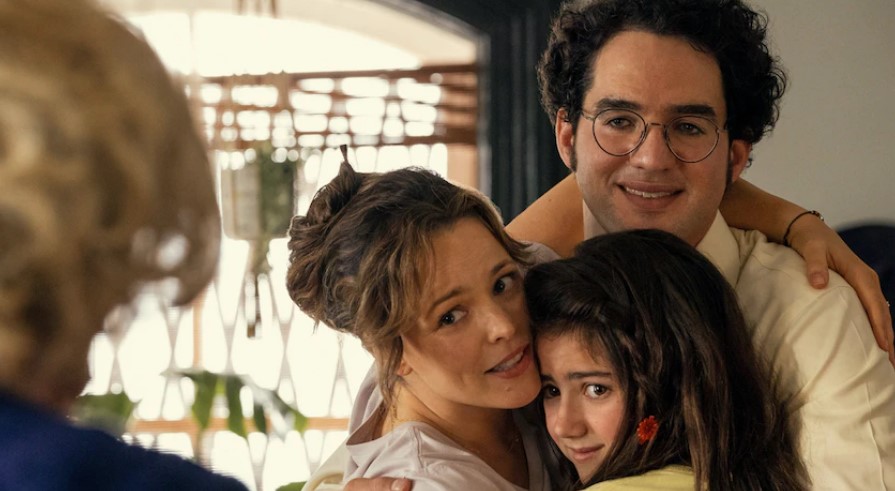Movie Info
Movie Info
- Director
- Kelly Fremon Craig
- Run Time
- 1 hour and 46 minutes
- Rating
- PG-13
VP Content Ratings
- Violence
- 1/10
- Language
- 1/10
- Sex & Nudity
- 3/10
- Star Rating
Relevant Quotes
With my voice I cry to the Lord;
with my voice I make supplication to the Lord.
I pour out my complaint before him;
I tell my trouble before him.

It isn’t often that an author will say of her novel that the film version is better than the book, but that is what Judy Blume said to the staff of The Today Show in an interview about the film version of her book Are You There, God? It’s Me, Margaret. The film, directed and written by Kelly Fremon Craig, follows the novel very faithfully, with every member of the excellent cast contributing to the humor and insights, so that I think fans of the iconic book—it sold 90 million copies!—will agree that the long wait has been well worth it.
The film is set in the same year that the book was published, 1970. 11-year-old Margaret (Abby Ryder Fortson) has just returned from summer camp to her Manhattan home when her euphoria is suddenly destroyed by news that the family is moving to a New Jersey suburb. It is her brash grandmother Sylvia Simon (Kathy Bates) who breaks the news, distraught that she will lose the almost daily contacts with her beloved granddaughter. Margaret is so upset—the loss of her friends as well as the closeness to the only grandmother she has known—that she cannot appreciate the cause of their move, the job promotion awarded to her father Herb Simon (Benny Safdie). Nor is the perky, can-do mother Barbara (Rachel McAdams) able to cheer up her daughter’s dashed spirits.
Despite the girl’s pleas—including to God, the three of them do move into a split-level house with its large, demanding lawn. All three will find themselves struggling to adapt—Herb, inadequate at lawnmowing soon hires a neighborhood boy, and Barbara, an art teacher so indecisive about furnishings that their living room will be devoid of couch and chairs for a long time.
Margaret fares better, quickly befriending the neighborhood go-getter Nancy Wheeler (Elle Graham) who invites her to run with her through the spray of a lawn hose, and then to join her “secret” club. Margaret accepts, including the stipulation that she not wear socks to school. Other members of the club include fellow 6th graders Gretchen (Katherine Mallen Kupferer) and Janie (Amari Price). At the first meeting of Nancy’s club each of them contributes a rule. All are obsessed with menstruation, boys, and bras. In regard to the latter, the girls try to rush their development by exercising together while chanting, “We must-We must-We must increase our bust!” Director Craig treats all this with respect, showing the universality of the girls’ anxiety and desires as they wend their way through puberty. Margaret will learn to cope with Nancy’s overbearance and big lie, emerging eventually as her own person.
The girl’s spiritual development, as indicated by the book’s title, is also beautifully dealt with. The title is the way that Margaret, like a young Tevya in skirts, begins her pleas to God whenever problems seem too large to handle by herself. Her first plea, back in Manhattan is, “Please don’t let New Jersey be too horrible”—and thanks to her new friends, and a kind teacher, it is anything but horrible. And there’s still her grandmother, with whom she keeps in touch by phone and occasional weekend visit—the sequence in which the pair attend an outdoor performance of “The Pirates of Penzance” and then enjoy sleeping in the same bed is a delight.
Margaret’s parents’ marriage is a mixed one– Barbara (Rachel McAdams), having been raised Christian and Herb (Benny Safdie) Jewish. In the late 50s this was a rarity, and Barbara’s parents were so rigid in their religious believers that they rejected their daughter and son-in-law, cutting of all contact with the Simons. Thus, Barbara and Herb had decided to raise Margaret in a nonreligious home, expecting her to choose her own faith when she comes of age. This is confusing to the girl, who decides to attend a synagogue service with her grandmother, then a lively Black church service because one of her new friends is African American, and then a white Protestant church. At Christmas time she attends a Christmas celebration. She likes the music but is not very impressed by any of the theology or practices.
This comes to a head when Barbara sends a Christmas card to her parents, and months later, they respond by writing that they will be flying in to meet the granddaughter they have never seen. This is catastrophic to Margaret because she has a plane ticket to fly down to Florida where her beloved grandmother is wintering. The atmosphere is tense between the Christian grandparents and Margaret and her family. Even more so when Sylvia decides to fly back to discover what is going on. At the supper table when Sylvia offers the toast “l’chaim,” all three Simons join in, but the so-called Christian grandparents look on in silence. Soon the conversation turns to Margaret and religion, with Sylvia maintaining that Margaret is Jewish. This leads to an uproar and the visiting pair leaving abruptly after an outburst from Margaret in which she denounces religion, and even God. At school her teacher had assigned her the topic of religion for her term paper, and she writes that what she has learned about religion is that it makes you fight. “I’ve prayed and prayed and everything just gets worse. I don’t know anymore what I think but maybe the truth is there’s nobody up there. There is nobody listening. There’s only just me.” I can relate to that because I was in the 6th grade when my parents were divorced. I prayed with tear-filled eyes that God would stop this from happening, but they split anyway, so I came to the same conclusion as Margaret.
People of faith will be intrigued by Margaret’s faith and her disdain of “religion” that almost results in her giving up prayer. The latter ensued from the dispute that arose among her family over whether she was a Christian or a Jew. In that dispute we can see in miniature all the close-mindedness, all the cruelty and suffering that organized religion has inflicted on those it has labeled heretics or infidels. This serious theme in a mostly funny film inspired me to take out again my marked up copy of Dietrich Bonhoeffer’s Letters and Papers From Prison and read those much discussed sections in which he raises the idea of a “religionless Christianity.” Given the bitter words that erupted between the Simons and Barbara’s bigoted parents, I think he would have applauded Margaret when she lashed out against her elders. (I don’t want to push the above too far, thus spoiling a very entertaining coming of age tale.)
One aspect of the film adaptation, and to which I believe that Judy Blume was referring to in her remarks in which she said she likes the film more than her book, is the depiction of the inner journey of Barbara. In the book, the mother is largely a blank character, but thanks to Craig’s script and a warm, engaging performance by Rachel McAdams, we see Barbara develop from a dutiful housewife and mother into an insightful mother and budding artist. Her move to New Jersey had meant giving up her own career as an art teacher and slipping into the role of submissive suburban mother and housewife—one more of those pretty-faced housewives known only as “Margaret’s mom” or “Herb’s wife.” At a PTA Meeting (attended solely by mothers) she meekly agrees to serve on a myriad of school committees at the behest of the domineering Jan Wheeler (Kate MacCluggage), Nancy’s mom. The running joke of not being able to decide upon a suitable couch for their bare living room shows her indecisiveness. She has her canvasses, paint and paintbrushes out, and so has to hide them when visitors come by. By the end of the film she has started teaching art again and has become a trusted confidante of her bright daughter.
The book has helped millions of girls navigate the rough shoals of puberty. This wonderful film will insure that Judy Blume’s compassionate insights will continue to inspire and assure its young viewers. For years the author had turned down offers to film the book, agreeing at last because something in Kelly Fremon Craig’s letter seeking the rights convinced her that this was the right filmmaker who understood her book. How right she was! It is the best family film that I have seen this year!
This review will be in the June issue of VP along with a set of questions for reflection and/or discussion. If you have found reviews on this site helpful, please consider purchasing a subscription or individual issue in The Store.

